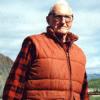
This is the continuation of an interview with Jim Scott on August 27, 1991 by William Schneider in the quiet den of the Scott's house in Eagle, Alaska. In this second part of a two part interview, Jim continues to talk about the presence of the National Park Service and the establishment of Yukon-Charley Rivers National Preserve. He shares his opinions about managing for resource protection versus development, the ideal of wilderness, and the impacts from park establishment in Alaska. He also talks about the misconceptions of the park concept, his dissatisfaction with bureaucratic waste, and places where he thinks park designation is appropriate.
Digital Asset Information
Project: Yukon-Charley Rivers National Preserve
Date of Interview: Aug 27, 1991
Narrator(s): Jim Scott
Interviewer(s): Bill Schneider
Themes
After clicking play, click on a section to navigate the audio or video clip.
Sections
1) Conflicts between agencies over the D-2 lands, the Alaska Native Claims Settlement Act, and the early planning for the Yukon-Charley Rivers National Preserve
2) Ideas about how public lands should be held in trust until they can be studied, instead of immediately establishing parks, refuges or forests
3) The Alaska Task Force study team that came to Eagle, the ironies of park development and impact, and the Eagle visitor's center
4) His hope that the National Park Service would control trespasses on public lands and protect the integrity of the natural and wildlife resources
5) Cultural and political issues that changed land acquisition and use after 1971
6) First people who came to administrate Yukon-Charley Rivers National Preserve, and the impact of their growing organization
7) More about the first people who came to administrate Yukon-Charley Rivers National Preserve
8) Reactions to the idea that there are national interests to be protected by the Yukon-Charley Rivers National Preserve
9) Ideals of pristine wilderness and protected habitats, and his idea of National Park Service resource protection
10) Misconceptions and untruths by state, Native, federal and private groups in the lands and parks controversies of the 1970s
11) Benefits of the National Park Service, areas where he feels their presence is warranted, and a reiteration of his dissatisfaction with bureaucratic waste
Click play, then use Sections or Transcript to navigate the interview.
After clicking play, click a section of the transcript to navigate the audio or video clip.
Transcript
Section 1: D-2 lands - competition for\ U.S. Forest Service - expansion\ Porcupine - forest production\ Fortymile - forest production\ U.S. Fish and Wildlife Service - expansion\ National Park Service - expansion\ Lands Act\ Breedlove, Bill\ Stenmark, Dick\ Howe, Bob\ Scott, Jim|
Section 2: Scott, Jim\ river people - trespass\ trespass - public lands\ homesteading - federal land\ homesteading - opposition to\ land use - studies\ Bureau of Land Management - management philosophy\ natural resources - "land bank"\ park - concepts\ wildlife refuge - concepts\ lands - "multiple use" concept\ Bureau of Mines|
Section 3: Howe, Bob\ Caulfield, Rick\ Brown, Bill\ Yukon-Charley - early planning\ Yukon-Charley - historical aspects\ Yukon-Charley - significance\ "valley of three smokes"\ trespass - river people\ river people - opposition to\ regulations - game\ National Park Service - expansion\ park concept - ironies\ National Park Service - impact\ Yukon-Charley - impact\ Eagle - NPS visitor center\ Eagle - attitudes|
Section 4: trespass - public lands\ cabins - trespass\ regulations - Bureau of Land Management\ Bureau of Land Management - trespass policy\ National Park Service - attitudes toward river people\ river people - attitudes toward\ cultural values - subsistence\ ANCSA - land freeze\ Native land claims\ Udall, Stuart\ river people - legality\ lands - selection|
Section 5: Lands Act\ civil rights movement - Alaska Natives\ oil discovery - Prudhoe Bay\ Native land claims\ "Mrs. Parks" - Birmingham\ oil industry - power\ "King Richard" - Nixon\ Alaska - economy\ Natives - economy|
Section 6: Mihalic, Dave\ Scott, Jim\ Eagle - attitudes\ Yukon-Charley - organizational growth\ Circle - attitudes towards NPS\ Yukon-Charley - promotion\ Yukon-Charley - opposition to studies\ marten - studies\ government spending - opposition to\ Yukon-Charley - impact\ Eagle - historic preservation\ Eagle - NPS goals\ Yukon-Charley - personnel\ public service - values\ Yukon-Charley - facilities locations\ National Park Service - level of technology\ Eagle - NPS visitor center|
Section 7: Mihalic, Dave\ Scott, Jim\ Eagle - attitudes\ Yukon-Charley - organizational growth\ Circle - attitudes towards NPS\ Yukon-Charley - promotion\ Yukon-Charley - opposition to studies\ marten - studies\ government spending - opposition to\ Yukon-Charley - impact\ Eagle - historic preservation\ Eagle - NPS goals\ Yukon-Charley - personnel\ public service - values\ Yukon-Charley - facilities locations\ National Park Service - level of technology\ Eagle - NPS visitor center|
Section 8: "motherhood pitch"\ Wrangell-Saint Elias - attributes\ Denali National Park - attributes\ preservation - aesthetics\ preservation - natural values\ land use - wilderness\ The Alaska Coalition - rationale\ preservation - priorities\ Kobuk sand dunes|
Section 9: resources - development\ The Alaska Coalition\ National Park Service - impact\ oil industry - power\ national interest - variable nature of\ legislation - protection concept\ Scott, Jim\ American society - materialism\ economics - primacy of|
Section 10: parks concept - misconceptions\ lands issues - misconceptions\ Wayburn, Ed\ Sierra Club\ resources - development - opposition to\ Stoddard, Chuck\ The Wilderness Society\ wilderness - de facto|
Section 11: Yosemite National Park\ Wrangell-Saint Elias\ Gates of the Arctic - opposition to\ National Park Service - studies\ Yukon-Charley - significance\ land - intangible values\ fire pro studies - opposition to\ government spending - priorities\ Pynchot, Gifford\ Roosevelt, Theodore\ federal agencies - power expansion|

